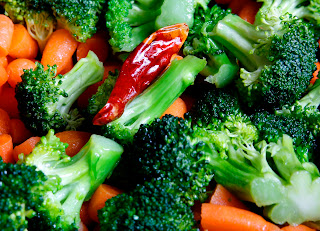Childrearing tips on feeding kids fruits and vegetables might seem redundant at least to some parents. But the surprising fact is that there are Mums and Dads who think it's no big deal. At least some parents think it's okay as long as they are eating some kind of food and not going hungry. Raising children anyway calls for, what they see as, far more important issues than insisting that children eat their fruits and vegetables. Well, not quite.
Fruits and Vegetables are Important
Fruits, vegetables and kids sometimes don't mix. And this is one thing that parents easily give up on. But fresh fruits and vegetables have a very important role in children's diet. They supply essential nutrients, enzymes, and vitamins in their natural form. These are the building blocks of good physical fitness and mental health as the child grows into adulthood. Make it a natural part of their lives.
 |
| Photograph courtesy Richcd-morguefile.com |
Eating fruits and vegetables as a matter of routine is an invaluable habit that parents can help inculcate in their children quite easily during the early childhood years. After that it might become an uphill task. Include fruits in breakfast and snack menus and veggies in lunch and dinner menus quite normally as you would chicken and dessert.
More Vegetables than Fruits
 |
| Photograph courtesy Irisheyes-morguefile.com |
Try to feed your children organic fruits and vegetables as far as possible. If buying conventionally grown stuff, make sure you wash off the pesticides thoroughly. You can't see or smell pesticides and might be driven to think a simple soak is good enough. No, it's not. You need to scrub them thoroughly and rinse well in flowing water, especially if you're making salads. When making salads,
as far as possible. If buying conventionally grown stuff, make sure you wash off the pesticides thoroughly. You can't see or smell pesticides and might be driven to think a simple soak is good enough. No, it's not. You need to scrub them thoroughly and rinse well in flowing water, especially if you're making salads. When making salads,
- Wash fruits and vegetables thoroughly
- Chop, slice, carve
into interesting shapes and figures
- Add salad dressing sparingly
- Avoid store-bought dressing
- Mix contrasting coloured vegetables to make it look enticing
- Give a huge platter of salad pride of place on the dining table
What Parents Can Do
Walk the walk and eat them yourself. Do not put down any fruit or vegetable however much you may dislike them personally. Do not resist buying some vegetable that you may not particularly like. You might be inadvertently denying your child something that could well turn out to be his favourite.
 |
| Photograph courtesy Anita Patterson-morguefile.com |
If your child consistently rejects certain vegetables, give him a break and gently re-introduce it later on when he's a bit older. Try new recipes. What she doesn't like grilled, she might take in a salad or boiled lightly. Use vegetables in slowcooker recipes, soups, salads, stir fries
recipes, soups, salads, stir fries , and juices
, and juices . When using vegetables,
. When using vegetables,
- Do not overcook
- Do not cook in large amounts of water
- Make your own salad dressing rather than store-bought ones
- Avoid deep-frying
- Avoid charring on barbeques
- Eat raw as much as possible
- Avoid genetically modified (GM) fruits and vegetables
Veggie Patch For Your Child
Give your child an active role in making grocery lists, shopping, washing fruits and vegetables before eating, salad preparation, and even setting up a vegetable garden
 |
| Photograph courtesy msthurnell-morgefile.com |
